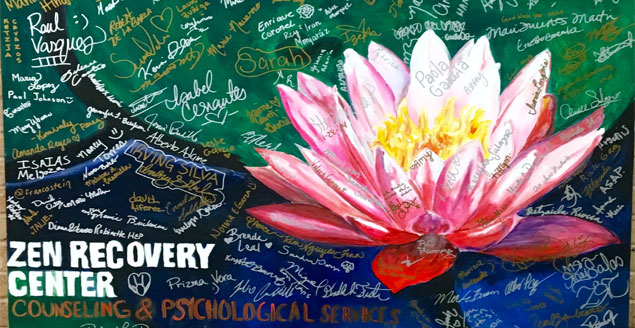Student Stories

My experience with the Collegiate Recovery Program began with an email sent to me early on in 2015. At the time I had been in recovery for a little over a year. I received the email and I quickly read through it and forgot about it, until one day during class we were covering a chapter on Alcohol and Alcoholism. I began to get a lot of anxiety and had to step out of the room to calm down. I returned to class knowing I had to get some help. I went back to look for the email I had received and found my way over to the CRP. Walking in I was greeted by Mr. Salas; he gave more information and told me about the Women’s Group that was being held on Wednesdays. I went to a few meetings that semester, was already starting to feel better, and learned more about handling my recovery. During the summer of that same year, Mr. Salas informed me that the CRP was looking for a volunteer so I quickly jumped at the opportunity and I am so glad I did! I spent the next 2 semesters (My Senior Year) helping out at the CRP. From passing out flyers, tabling, and helping to organize events, I was able to meet a lot of people. It also helped me learn about other organizations that I was able to be part of such as ASAP (Aspiring Substance Abuse Professionals) and LIFT (Living in Freedom Today). In April 2016 I was able to go to a luncheon at UT Austin and meet others from their Center for Students in Recovery. It was an amazing experience to be able to get together with others like myself and hear all the success stories of recovery. I cannot thank the CRP enough for everything that they did for me. Everything that I learned and the experience I got from being a part of that program is something I will never forget. My passion for helping others reach recovery grew immensely over the course of that year and made a huge impact in my own recovery as well. Thanks to the Collegiate Recovery Program for making a difference in my life.
-Erika Salinas
There are many reasons why people get addicted to drugs or alcohol. My story started early, while I was still in elementary school. I began having excruciating migraine headaches and eventually had sinus surgery to correct a deviated septum at the age of 11. Though the surgery was a success, my migraines persisted. My doctor first tried prescribing Imitrex however I had an anaphylactic reaction to it and any other related medication. After exhausting every viable option, the only way I could deal with the pain was using narcotic medication. I will never forget that euphoric rush I felt the first time I tried them. Though I was too young at the time to understand the concept of drug abuse, I knew I wanted to experience that rush again.
By high school I was using multiple drugs recreationally, however my addiction to opiate pain medication hit its peak once I started college. By the end of my freshman year I was using every day. No one ever knew that I struggled with this issue because I had excellent grades (Dean's list) and I was still attending church regularly. However, things spiraled out of control my junior year once I began using heroin and stronger opiate medications. I destroyed everything good in my life chasing after that first high. Nothing else mattered because that thought of going through withdrawal terrified me. Eventually I resorted to stealing and burglarizing houses to feed my addiction until I finally got arrested. It was difficult to sit behind that glass and admit everything to my mother. Her worst fears had come true. I was an addict.
Though I had successfully completed my probation and attended court ordered drug counseling, I continued to struggle with my addiction. I was actively involved with my church and would pray that God would remove this addiction, but every time I walked out of those doors I knew deep down that I still craved that high. It wasn't until I had my son in 2013 that my life truly changed for the better. Before, I would never reach out for help or even openly admit that I was an addict. Ultimately, that is the reason why I couldn't go more than a year without relapsing. As I held my son and adjusted to being a mother, I finally built up the courage to reach out for help. I entered a methadone maintenance program and soon enrolled in college to finish up my degree. While there I decided to visit the man who counseled me years earlier. He directed me to the Collegiate Recovery Program and introduced me to everyone. I finally felt at peace knowing that I didn't have to hide or be ashamed of myself because there were other students just like me. I often told myself that I could never amount to anything because I would always be an addict, but after meeting with others at the CRP I was able to see that anything is possible as long as I keep prioritizing my recovery. Yes, you may relapse but as time goes on you will see that those relapses get further and further apart.
I just wanted to thank the people at the CRP for offering such a great support system that allows people to address addiction and mental health.
- Marisa Davila.
